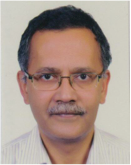Arunaloke Chakrabarti
Dr Arunaloke Chakrabarti earned his MD in Microbiology from Postgraduate Institute of Medical Education & Research, Chandigarh, India in 1985 and is presently working as Professor In-Charge, Division of Mycology at the same Institute.
He is currently the Vice-President of International Society for Human and Animal Mycology (ISHAM), President of Society for Indian Human and Animal Mycologists (SIHAM), President of Indian Association of Medical Microbiologists, Coordinator of the ISHAM working group on ‘Fungal sinusitis’ and ‘ABPA in asthmatics’, chair of ‘Asian Fungal Working Group’, and member of two more ISHAM working groups. He is Associate Editor of ‘Medical Mycology’, and Editor/Associate Editor/Deputy Editor of three more journals - Mycopathologia, Journal of Medical Microbiology, Mycoses.
He has published >170 papers in the field of Medical Mycology and delivered lectures in >100 medical conferences and societies. He wrote chapters in 11 books. His major contribution is in the field of epidemiology of fungal sinusitis, mucormycosis, and hospital acquired fungal infections. His laboratory identified the endemic regions of fungal sinusitis, sporotrichosis, penicilliosis, source of Cryptococcus gattii in India, emergence of Apophysomyces elegans in tropical countries. His laboratory investigated many nosocomial fungal outbreaks in developing countries, and developed molecular identification and typing methods of zygomycetes. He received multiple awards from National Societies, Academies of India, and was awarded the Fellow of National Academy of Medical Sciences and Fellow of The National Academy of Sciences, India.
He has consistently helped in the development of the discipline of Medical Mycology and laboratories in India. He conducts two training courses on medical mycology every year at his center. His laboratory is now recognized as ‘Center of Advanced Research in Medical Mycology’ in India, ‘WHO Collaborating Center for Reference and Research on Fungi of Medical Importance’. Recently ‘National Culture Collection of Pathogenic Fungi’ has been added to his laboratory.
Jorge Alvar
Jorge Alvar graduated in Medicine and Surgery from the Complutense University of Madrid in 1979, and a diploma of Tropical Medicine & Parasitology in Hamburg, Germany. Further, he obtained his PhD in Medicine before completing a post doctorate at Cambridge University. He was the Medical Officer in charge of the Leishmaniasis Control Programme in the Department of Neglected Tropical Diseases at the World Health Organization (WHO), having launched an ambitious strategic plan and specific control programmes in different regions and countries. Prior to this he was the director of the National Centre of Tropical Medicine at the Institute of Health Carlos III, Madrid, Spain.
Jorge has considerable expertise in, and has received awards for his research in leishmaniasis epidemiology, chemotherapy and diagnosis, canine infection, and AIDS co-infection. He has a wide publication record spanning over 25 years and is also member of the editorial board for different journals, and a fellow of the Royal Academy of Medicine, Spain. His leishmaniasis expertise and advocacy has resulted in a global donation campaign of liposomal amphotericin B which he now administers from DNDi.
Michel P. Glauser
Michel P. Glauser, MD, FRCP, FIDSA, FAAM, Honorary Professor of Medicine at the University of Lausanne (UNIL) , was formerly chief of the Service of Infectious Diseases at the Centre Hospitalier Universitaire Vaudois (CHUV) and former Dean of the Faculty of Biology and Medicine of the UNIL.
Michel Glauser studied medicine in Lausanne, Hamburg and Berlin. After graduation, he trained in internal medicine in Lausanne, and in infectious diseases at Yale University and the University of California in San Diego. In 1978 he was appointed Chief of Infectious Diseases at the University Medical Center in Lausanne and in this role, he developed several lines of research in experimental pyelonephritis, experimental endocarditis, experimental and clinical sepsis and septic shock, infections in neutropenic patients, fungal infections and AIDS, all domains in which the groups he created and managed contributed significantly to the understanding of the pathophysiology, treatment and prevention of these diseases. He coordinated several large international clinical studies in these domains.
Nationally, Michel Glauser has been for 10 years a member of the Research Council of the Swiss National Foundation for Research , of which he presided the Division of Biology and Medicine, and for 12 years he has presided the Swiss Federal Commission for Control and Research on AIDS. He has been the founder of Funginos, a Swiss cohort study on fungal infections. He created a number of scientific and educational manifestations in the field of infectious diseases and microbiology. He is one of the founder of the Swiss Society for Infectious Diseases, of which he is the honorary President.
Internationally, Michel Glauser was for several years President of the International Antimicrobial Therapy Cooperative Group of the EORTC, President of the European Society of Clinical Microbiology and Infectious Diseases, President of the International Immunocompromised Host Society, and a member of the ICAAC Program Committee.
Since retirement from his clinical responsibilities, Michel Glauser is fully involved in several philanthropic organisations and in particular until recently was the President of one of the largest national foundations active in medical research, as well as in cultural and social activities, the Fondation Leenaards.
Michel Glauser is a Swiss Board member and a Trustee of GAFFI, UK.


